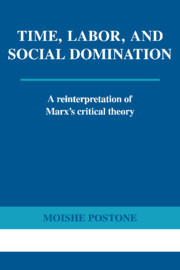Book contents
- Frontmatter
- Contents
- Acknowledgments
- Part I A critique of traditional Marxism
- Chapter 1 Rethinking Marx's critique of capitalism
- Chapter 2 Presuppositions of traditional Marxism
- Chapter 3 The limits of traditional Marxism and the pessimistic turn of Critical Theory
- Part II Toward a reconstruction of the Marxian critique: the commodity
- Part III Toward a reconstruction of the Marxian critique: capital
- Selected bibliography
- Index
Chapter 3 - The limits of traditional Marxism and the pessimistic turn of Critical Theory
from Part I - A critique of traditional Marxism
Published online by Cambridge University Press: 10 November 2009
- Frontmatter
- Contents
- Acknowledgments
- Part I A critique of traditional Marxism
- Chapter 1 Rethinking Marx's critique of capitalism
- Chapter 2 Presuppositions of traditional Marxism
- Chapter 3 The limits of traditional Marxism and the pessimistic turn of Critical Theory
- Part II Toward a reconstruction of the Marxian critique: the commodity
- Part III Toward a reconstruction of the Marxian critique: capital
- Selected bibliography
- Index
Summary
In the previous chapters I examined some fundamental assumptions underlying traditional Marxism's interpretation of the basic contradiction of capitalism as one between the market and private ownership, on the one hand, and industrial production, on the other. The limits and dilemmas of such an interpretation increasingly have become manifest in the course of the historical development of postliberal capitalism. In this chapter, I shall investigate those limits more closely by critically examining some basic aspects of one of the richest and most powerful theoretical responses to that historical development—the approach that has come to be known as that of the “Frankfurt School,” or “Critical Theory.”
Those who formulated the general framework of Critical Theory—Theodor W. Adorno, Max Horkheimer, Leo Lowenthal, Herbert Marcuse, Friedrich Pollock, and others who had been associated with the Institut für Sozialforschung in Frankfurt or its journal, the Zeitschrift für Sozialforschung—sought to develop a fundamental social critique that would be adequate to the transformed conditions of postliberal capitalism. Influenced in part by Georg Lukács's History and Class Consciousness (though without adopting his identification of the proletariat as the identical subject-object of history), they proceeded from a sophisticated understanding of Marx's theory as a critical and self-reflexive analysis of the intrinsic interrelation of the social, economic, political, and cultural dimensions of life in capitalism. In the course of confronting and conceptualizing the significant transformations of capitalism in the twentieth century, they developed and placed at the center of their concern a critique of instrumental reason and the domination of nature, a critique of culture and ideology, and a critique of political domination.
- Type
- Chapter
- Information
- Time, Labor, and Social DominationA reinterpretation of marx's critical theory, pp. 84 - 120Publisher: Cambridge University PressPrint publication year: 1993



